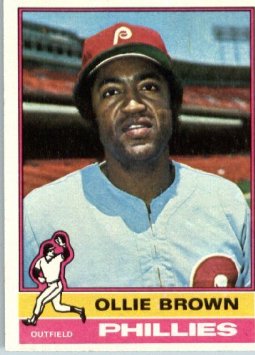“Downtown” Ollie Brown Boxing with Giants
By Dr. Daniel Durbin | 8/5/13 |
“Downtown” Ollie Brown Boxing with Giants
Dan Durbin
The night was wearing on for the Rookie League team from Salem, Virginia. It was the start of a two week road trip and the players were tired and ready for bed. The team bus pulled up to a West Virginia hotel and the team’s manager stood up at the front of the bus.
“All you black players stay on board.”
It was 1963. And, as happened in West Virginia in 1963, the white players stepped off the bus and walked up to the hotel. The blacks stayed on the bus.
After the white players were gone, the manager explained to the African-American players left on board that they were not allowed to stay in this hotel and would be taken to the home of an African-American family that would house them.
On that bus, listening in disbelief, sat a 19 year old player with a cannon of a right arm named Ollie Brown.
Ollie Brown was brought up in Long Beach, California, growing up with friends from many ethnic backgrounds. Ollie had not complained when the Giants’ Rookie League team housed him with an African-American family in Salem. He was happy to have a family atmosphere 3,000 miles from home.
But, this was different. This was wrong. This was diminishing, dehumanizing a group of men solely because of the color of their skin.
Saying this was the South and the South had its traditions did nothing to make it right. Being below the Mason-Dixon Line did not suddenly turn wrong into right. And, it gnawed at him.

For two weeks, it gnawed at him. Ollie Brown lost the better part of ten pounds on that road trip.
When the team got back to Salem, Brown confronted his manager. He told his manager to tell the executives in the Giants organization that he could not play under these conditions. Either they move him or he would leave baseball.
Maybe it was the innocence of youth. Maybe it was simply a man who had reached the limits of what he would do to keep a baseball career. But, in an era when teams owned players for life, when baseball’s reserve clause made players, in Curt Flood’s famous words, “well-paid slaves,” a 19 year old kid from Long Beach took on the Giants organization.
And the Giants flinched.
The Giants moved Brown to Decatur, Illinois.
Ollie Brown would go on to terrorize pitchers in A Ball in Fresno, California, clubbing home runs that would earn him the nickname “Downtown.” For a decade, Brown would equally terrorize runners in the Major Leagues. His throws to gun down the game’s fastest runners when they tried to reach home plate from second base live on in baseball lore.
Brown would become the “original Padre,” the first player chosen by the San Diego Padres in the expansion draft of 1968. He would also go on to play for the great 1972 Oakland A’s and the powerhouse Philadelphia Phillies of the late 1970s.
Had the Giants not moved him to Decatur, Ollie Brown might well have lost all of that for a matter of principle.
“Downtown” Ollie Brown discussed that night in West Virginia and many other events that made up his baseball career and life for the USC Annenberg Institute of Sports, Media and Society’s oral histories project. You can find information about the African-American Experience in Major League Baseball project on the following link.
AISMS African - American Experience in Major League Baseball Research Project
Brown discussed the players, the plays, the teams, and the culture that made up his baseball career. When talking about that dark night in West Virginia fifty years ago, he spoke of it as simply another event in his baseball career. He didn’t see his actions as a challenge to the Giants or anything more than a response to an intolerable situation.
Courage is a curious thing. The person who shows it is often the last to know it. It never seems an act of courage to them. It only seems the thing they had to do.
The summer of 1963 saw many courageous acts across the South in sit-ins, freedom rides, and marches. Those acts seemed a world away from the cloistered conservatism of professional baseball. But, baseball kept alive many of the worst inequities of the broader culture and saw its own, often forgotten, acts of resistance.
In the summer of 1963, a 19 year old baseball player with one of the great arms the game would ever see threatened to leave the game before his career even began. He resisted. It only seemed the thing he had to do.

COMMENTS